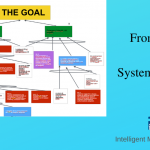Leaders and managers must take their thinking ability to a whole new level for today’s pace of change This is not the time for business as usual. Companies must be able to react fast to change and, more importantly, think ahead and plan in a robust way. This is because today’s world is complex. Complexity […]
Search Results for: network of projects
HOW TO
What we do and how it works: One Step Beyond At Intelligent Management, we are NOT conventional consultants, facilitators, mentors or advisors. We are organizational scientists. We assist decision-makers with the authority and responsibility to carry out meaningful change. Our world has changed and conventional recipes are no longer sufficient to anticipate and take advantage […]
How can we organize ourselves to interact towards a common goal?
Digital transformation, COVID and an uncertain global scenario are awakening us to the realization that we’re all part of a network of networks. These are networks of conversations. This calls for a very different way of working, communicating, growing and making the most of our talents. Diversity is our natural ally in this. Economic and […]
OUR MINDS CAN’T DO IT ALONE, BUT WITH A LITTLE HELP FROM OUR FRIEND MATH…
A new covenant for a new economics Digital transformation, COVID and an uncertain global scenario are awakening us to the realization that we’re all part of a network of networks of conversations. This calls for a different way of working, communicating, growing and making the most of our talents. Diversity is our natural ally in […]
A Practical Process for Working Remotely in a Team from the Theory of Constraints
Over the last three weeks of lockdown in Italy, the team at Intelligent Management has been working intensively with clients and partners remotely. We have been able to switch from working onsite to working remotely with great ease thanks to years of consolidated practice using the Thinking Processes from the Theory of Constraints. People always […]
The Theory of Constraints and Reaching New Heights
It’s complicated to shift our perception and the way we think if we live in a culture out of synch with what we are trying to achieve. That’s because we all live within networks of conversations that inevitably influence how we see the world. We are all ultimately free to choose our own path, but […]
Celebrating a Year of Disruptive Thinking
As 2019 comes to a close, all of us at Intelligent Management send our warmest wishes to those who have taken the time to read our work. We are proud to have concluded another year of disruptive thinking. It is not disruption for the sake of it, but the creative disruption that comes from challenging […]
From SWOT to Systemic Strategy
When we published our post about how to take the SWOT analysis to a whole new level we received a lot of attention and some good questions. One of the best is below: And here is our reply: The SWOT analysis can be a helpful brainstorming tool as a first step to understand our current […]
It Takes a C-Suite with a Clear Purpose to Go Beyond Shareholder Value
The Business Roundtable recently announced a major policy change declaring that the purpose of a corporation is not just to serve shareholders – its official position since 1997 – but “to create value for all our stakeholders.” Over the last 25 years, Intelligent Management has developed and implemented a systemic approach to management that inherently brings attention to the […]
How to Do New Product Development Seamlessly with a Systems Approach
Any organization that wishes to innovate must be able to develop new products. The ability to develop new ideas, and new products in particular, can be stimulated and increased systemically by addressing the “cognitive limits” of the organization using the Thinking Processes from the Theory of Constraints. The capacity to continuously innovate has become a […]













